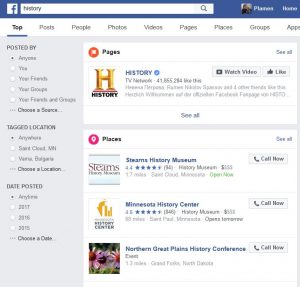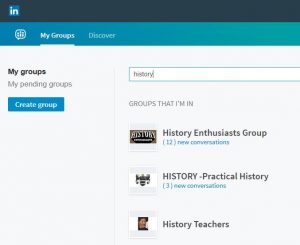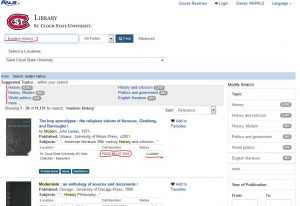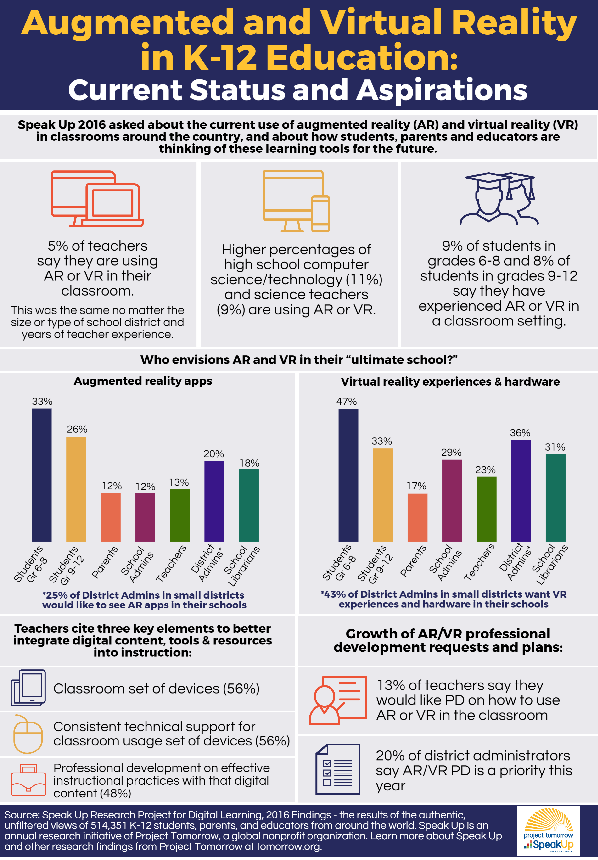teaching with emerging technologies
Michelle Pacansky-Brock http://teachingwithemergingtech.com/
Best Practices for Teaching with Emerging Technologies
Digital Literacy for St. Cloud State University
Michelle Pacansky-Brock http://teachingwithemergingtech.com/
https://magic.piktochart.com/output/5383776-how-to-humanize-your-online-cl
+++++++++++++++++++++++++
more on online ed in this IMS blog
https://blog.stcloudstate.edu/ims?s=online+education
per LITA listserv
We are looking for a free alternative to Microsoft Access. We have looked at Base which is part of LibreOffice and OpenOffice. However, as far as we can determine, Base does not allow us to import a CSV file into the database as a table. Such a feature would be important to us as we frequently need to import text files.
We would like to be able to query the database using SQL.
Microsoft Access supports Visual Basic Application. We would like a database that works with C#, Java or JavaScript in the same way
++++++++++++++++++++++++
https://help.libreoffice.org/Common/Importing_and_Exporting_Data_in_Base
Gnumeric. https://portableapps.com/apps/office/gnumeric_portable
Plamen Miltenoff – http://web.stcloudstate.edu/pmiltenoff/faculty/
with Heather Abrahamson, Becker High School Social Studies, 763-261-4501 (Ext. 3507)
9:50-11:15; 11:20-11:45; 12:20-1:20 |
link to this blog entry: https://blog.stcloudstate.edu/ims/2017/05/01/history-becker/
short link – http://bit.ly/histbecker
+++++++++++++++++++++
list of web sites with images for the students’ projects:
https://www.ushmm.org/collections/the-museums-collections/about/photo-archives
http://www.jewishvirtuallibrary.org/holocaust-photographs
https://go.fold3.com/holocaust_records/
https://www.wienerlibrary.co.uk/Photographs
https://www.thoughtco.com/large-collection-of-holocaust-pictures-1779703
http://www.yadvashem.org/yv/en/holocaust/resource_center/item.asp?gate=4-2
http://www.gettyimages.com/photos/cold-war
http://www.coldwar.org/museum/photo_gallery.asp
http://www.cnn.com/2014/03/04/world/gallery/cold-war-history/
http://time.com/3879870/berlin-wall-photos-early-days-cold-war-symbol/
http://digitalarchive.wilsoncenter.org/theme/cold-war-history
http://archive.millercenter.org/academic/dgs/primaryresources/cold_war
http://www.gettyimages.com/editorialimages/archival
https://www.archives.gov/research/alic/reference/photography.html
+++++++++++++++++++++
Defining my interests. Narrowing a topic. How do I collect information? How do I search for information?
| How do we search for “serious” information? | |
|
|
|
|
https://www.google.com/; https://scholar.google.com/ (3 min); http://academic.research.microsoft.com/; http://www.dialog.com/; http://www.quetzal-search.info; http://www.arXiv.org; http://www.journalogy.com/ |
|
http://digg.com/, https://www.reddit.com/, https://www.quora.com/ StackExchange http://stackexchange.com/Kngine.com; AskScience https://www.reddit.com/r/askscience/, , and similar, https://medium.com/ (5 min) |
| YouTube, SlideShare https://www.slideshare.net/ and similar | https://www.slideshare.net/search/slideshow?searchfrom=header&q=modern+history |
|
(10 min) |
| Wikipedia | https://en.wikipedia.org/wiki/Modern_history |
| blogs, listservs | http://www.bestcollegesonline.com/blog/100-awesome-blogs-for-history-junkies/ |
 |
|
 |
|
| LinkedIn Groups https://www.linkedin.com/groups/my-groups |  |
| team work | using your social media accounts (e.g. Facebook, Twitter), search for information related to your topic of interest (5 min) |
|
|
|
|
https://www.semanticscholar.org/ |
|
(20 min) |
| every university library has subject guides for different disciplines. here are the ones from SCSU http://stcloud.lib.mnscu.edu/subjects/guide.php?subject=HIST-WOR | Kahoot game (5 min) |
| basic electronic (library) search information and strategies. Library research services (5 min)
using the library database, do a search on a topic of your interest. compare the returns on your search. make an attempt to refine the search. retrieve the following information about the book of interest: is it relevant to your topic (check the subjects); is it timely (check the published date); is it available |
  |
| Strategies for conducting advanced searches (setting up filters and search criteria) | |
| Articles and databases (10 min) |     |
| Kahoot competition | use your smart phones to find the best researcher among you https://play.kahoot.it/#/k/c376c27a-d39a-4825-8541-1c1ae728e1bc https://play.kahoot.it/#/k/5e6d126f-be4d-47d0-9b6e-dfc3f2c90e61 https://play.kahoot.it/#/k/89706729-3663-4ec3-a351-173bf1bf4ed7history: https://play.kahoot.it/#/k/7510e6d8-170f-4c0c-b7bd-6d7dd60c3f6e |
| Reference and Facts | |
| Streaming and Video | http://www.stcloudstate.edu/library/research/video.aspx |
| Journal Title and Citation Finder | |
| shall more info be needed and or “proper” session with a reference librarian be requested | http://stcloud.lib.mnscu.edu/subjects/guide.php?subject=EDAD-D |
| Institutional Repository | http://repository.stcloudstate.edu/ |
|
|
| Academic.com and ResearchGate | |
|
|
|
|
http://bit.ly/360lib and http://bit.ly/360lib2; http://bit.ly/VRlib (15 min) |
|
|
|
|
|
| Refworks | https://www.refworks.com/refworks2/default.aspx?r=authentication::init& |
| Zotero, Mendeley, Endnote | |
| Fast and easy bibliographic tools: | https://blog.stcloudstate.edu/ims/2013/12/06/bibliographic-tools-fast-and-easy/ |
| Primary and secondary sources video | |
++++++++++++++++++
more on history in this IMS blog
https://blog.stcloudstate.edu/ims?s=history
Intelligence has always been used as fig-leaf to justify domination and destruction. No wonder we fear super-smart robots
https://aeon.co/essays/on-the-dark-history-of-intelligence-as-domination
To say that someone is or is not intelligent has never been merely a comment on their mental faculties. It is always also a judgment on what they are permitted to do. Intelligence, in other words, is political.
The problem has taken an interesting 21st-century twist with the rise of Artificial Intelligence (AI).
The term ‘intelligence’ itself has never been popular with English-language philosophers. Nor does it have a direct translation into German or ancient Greek, two of the other great languages in the Western philosophical tradition. But that doesn’t mean philosophers weren’t interested in it. Indeed, they were obsessed with it, or more precisely a part of it: reason or rationality. The term ‘intelligence’ managed to eclipse its more old-fashioned relative in popular and political discourse only with the rise of the relatively new-fangled discipline of psychology, which claimed intelligence for itself.
Plato conclude, in The Republic, that the ideal ruler is ‘the philosopher king’, as only a philosopher can work out the proper order of things. This idea was revolutionary at the time. Athens had already experimented with democracy, the rule of the people – but to count as one of those ‘people’ you just had to be a male citizen, not necessarily intelligent. Elsewhere, the governing classes were made up of inherited elites (aristocracy), or by those who believed they had received divine instruction (theocracy), or simply by the strongest (tyranny).
Plato’s novel idea fell on the eager ears of the intellectuals, including those of his pupil Aristotle. Aristotle was always the more practical, taxonomic kind of thinker. He took the notion of the primacy of reason and used it to establish what he believed was a natural social hierarchy.
So at the dawn of Western philosophy, we have intelligence identified with the European, educated, male human. It becomes an argument for his right to dominate women, the lower classes, uncivilised peoples and non-human animals. While Plato argued for the supremacy of reason and placed it within a rather ungainly utopia, only one generation later, Aristotle presents the rule of the thinking man as obvious and natural.
The late Australian philosopher and conservationist Val Plumwood has argued that the giants of Greek philosophy set up a series of linked dualisms that continue to inform our thought. Opposing categories such as intelligent/stupid, rational/emotional and mind/body are linked, implicitly or explicitly, to others such as male/female, civilised/primitive, and human/animal. These dualisms aren’t value-neutral, but fall within a broader dualism, as Aristotle makes clear: that of dominant/subordinate or master/slave. Together, they make relationships of domination, such as patriarchy or slavery, appear to be part of the natural order of things.
Descartes rendered nature literally mindless, and so devoid of intrinsic value – which thereby legitimated the guilt-free oppression of other species.
For Kant, only reasoning creatures had moral standing. Rational beings were to be called ‘persons’ and were ‘ends in themselves’. Beings that were not rational, on the other hand, had ‘only a relative value as means, and are therefore called things’. We could do with them what we liked.
This line of thinking was extended to become a core part of the logic of colonialism. The argument ran like this: non-white peoples were less intelligent; they were therefore unqualified to rule over themselves and their lands. It was therefore perfectly legitimate – even a duty, ‘the white man’s burden’ – to destroy their cultures and take their territory.
The same logic was applied to women, who were considered too flighty and sentimental to enjoy the privileges afforded to the ‘rational man’.
Galton believe that intellectual ability was hereditary and could be enhanced through selective breeding. He decided to find a way to scientifically identify the most able members of society and encourage them to breed – prolifically, and with each other. The less intellectually capable should be discouraged from reproducing, or indeed prevented, for the sake of the species. Thus eugenics and the intelligence test were born together.
From David Hume to Friedrich Nietzsche, and Sigmund Freud through to postmodernism, there are plenty of philosophical traditions that challenge the notion that we’re as intelligent as we’d like to believe, and that intelligence is the highest virtue.
From 2001: A Space Odyssey to the Terminator films, writers have fantasised about machines rising up against us. Now we can see why. If we’re used to believing that the top spots in society should go to the brainiest, then of course we should expect to be made redundant by bigger-brained robots and sent to the bottom of the heap.
Natural stupidity, rather than artificial intelligence, remains the greatest risk.
++++++++++++++++++++++
more on intelligence in this IMS blog
https://blog.stcloudstate.edu/ims?s=intelligence
https://v4-alpha.getbootstrap.com/getting-started/download/
https://en.wikipedia.org/wiki/Bootstrap_(front-end_framework)
jQuery
Crowdfunded online publication from Jimmy Wales will pair paid journalists with army of volunteer contributors
Monday 24 April 2017 19.01 EDT Alex Hern Technology reporter
Jimmy Wales, the co-founder of Wikipedia, is launching a new online publication which will aim to fight fake news by pairing professional journalists with an army of volunteer community contributors.
Wikitribune plans to pay for the reporters by raising money from a crowdfunding campaign.
The ideas behind Wikitribune are similar to other experiments with sustainable community journalism.
Dutch news website De Correspondent, for instance, was launched in 2013 after a €1m (£850,000) crowdfunding campaign, with a goal of focusing on reporter-led in-depth coverage of a select few topics backed up by strong involvement from a community of financial backers.
In March, the site announced a push into the US market, funded by a $515,000 (£400,000) grant from a number of digital news charities.
++++++++++++++++
more on fake news in this IMS blog
https://blog.stcloudstate.edu/ims?s=fake+news
By Richard Chang 04/21/17
survey by the nonprofit organization Project Tomorrow.
annual Speak Up survey of more than 510,000 K–12 students, parents and educators
Middle school students seem to be the most excited about AR and VR in the school setting. Among students in grades 6 through 8, 33 percent said they would like to see augmented reality apps in their ultimate school, and 47 percent of those kids said they would like to see virtual reality experiences and hardware in their ultimate school.
teachers, principals and parents were more skeptical. Only 12 percent of parents and principals said they want to see AR apps in their ultimate school, while 13 percent of teachers said the same.

+++++++++++++++++
more on VR in this IMS blog
https://blog.stcloudstate.edu/ims?s=virtual+reality
more on AR in this IMS blog
https://blog.stcloudstate.edu/ims?s=augmented+reality
Rethinking Digital Literacy
facilitated by Paul Signorelli 4-week eCourse Beginning Monday, May 1, 2017
Learning outcomes
After participating in this course, you will be able to:
What is digital literacy? Do you know how you can foster digital literacy through formal and informal learning opportunities for your library staff and users?
Supporting digital literacy still remains an important part of library staff members’ work, but sometimes we struggle to agree on a simple, meaningful definition of the term. In this four-week eCourse, training/learning specialist Paul Signorelli will begin by exploring a variety of definitions, focusing on work by a few leading proponents of the need to foster digital literacy among people of all ages and backgrounds. He will explore a variety of digital-literacy resources – including case studies of how we creatively approach digital-literacy learning opportunities for library staff and users, and will explore a variety of digital tools that will help to encourage further understanding of this topic.
Now, who is ready to build their digital-literacy skills and help their users become digitally literate as well?
eCourse Outline
Part 1: Digital Literacy: Initial Definitions and Explorations
Part 2: Digital Literacy: Crap Detection and Other Skills and Tools
Part 3: Digital Literacy in Learning
Part 4: Fostering Digital Literacy: Creating Within a Digital Environment
+++++++++++++++
more on digital literacy in this IMS blog
https://blog.stcloudstate.edu/ims?s=digital+literacy
+++++++++++++++++++
https://blog.stcloudstate.edu/ims?s=digital+storytelling